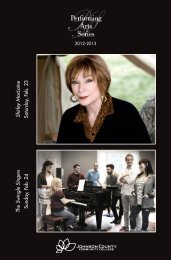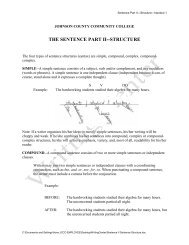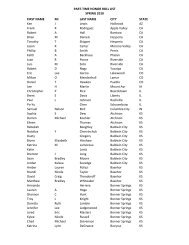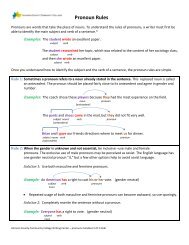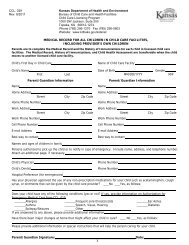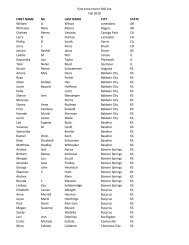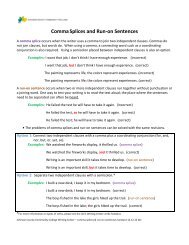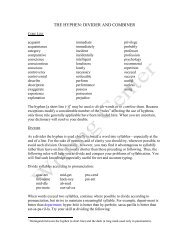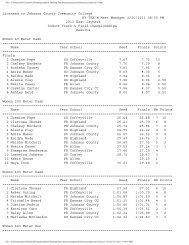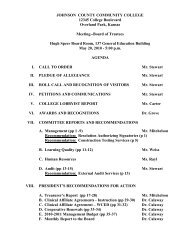League Reaffirmation - Johnson County Community College
League Reaffirmation - Johnson County Community College
League Reaffirmation - Johnson County Community College
Create successful ePaper yourself
Turn your PDF publications into a flip-book with our unique Google optimized e-Paper software.
History of JCCC<br />
In the 1960s, residents of <strong>Johnson</strong> <strong>County</strong> began to seriously consider the creation of a local college. The area<br />
had a rapidly growing population and a good school system from which a local college could draw students,<br />
and it was hard to ignore the community college movement emerging in California, Florida, Illinois and Texas.<br />
The idea was not unopposed, however; some residents felt the county didn’t need to assume the increased<br />
expenses of maintaining a college.<br />
Then, in June 1963, the nation’s leading experts in community college education gathered in Kansas City for<br />
the Midwest Junior <strong>College</strong> Conference to discuss the potential of community colleges in the U.S. Residents in<br />
Kansas City, Mo., were considering forming a large district that would probably include three community colleges.<br />
The movement was hard to resist.<br />
Across the state line, the <strong>Johnson</strong> <strong>County</strong> Board of <strong>County</strong> Commissioners formed a committee of 18 residents<br />
to study the feasibility of a community college for <strong>Johnson</strong> <strong>County</strong>. The chairman of that committee was<br />
Dr. Wilbur T. Billington, a prominent banker with the Kansas City Federal Reserve Bank and a member of the<br />
board of education of one of the local school districts. With the help of the <strong>League</strong> of Women Voters and the<br />
American Association of University Women, the feasibility committee conducted a countywide needs assessment<br />
that demonstrated a greater need for a local college than had been suspected. The committee began to build<br />
the case for a community college in <strong>Johnson</strong> <strong>County</strong>.<br />
A citizens action committee was mobilized to implement the recommendation of the feasibility committee.<br />
A petition signed by all school boards in the county requested the formation of a community junior college<br />
district to be governed by six trustees elected at large. <strong>Johnson</strong> <strong>County</strong> <strong>Community</strong> <strong>College</strong> became the first<br />
new college recommended for creation under the Kansas <strong>Community</strong> Junior <strong>College</strong> Act of 1965. A special<br />
countywide election was held in March 1967, and the proposed community college was approved by a 31<br />
majority. The district was formally established in June 1967, and voters were asked to elect college trustees in<br />
September. Thirtysix people filed for the election. Among the six elected to the new board was Dr. Wilbur Billington.<br />
In 1968, the board obtained a “nofund warrant” to provide for interim financing until the first tax levy could be<br />
established. The board also selected the first president for the college, identified the site that would eventually<br />
become the permanent campus and developed the first mission statement for the college.<br />
In 1969, county residents voted approval of $12.9 million in general obligation bonds to purchase more than<br />
200 acres in Overland Park, which would turn the idea for a college campus into a reality. In the meantime,<br />
the first JCCC classes were conducted in leased facilities in Merriam that fall. Initial enrollment was 1,380 students.<br />
12<br />
History highlights<br />
1973 | The <strong>Johnson</strong> <strong>County</strong> <strong>Community</strong> <strong>College</strong> Foundation is formed.<br />
The college is fully accredited by the Kansas State Department of<br />
Education.<br />
1975 | JCCC is granted accreditation from the North Central Association of<br />
<strong>College</strong>s and Schools.<br />
1977 | The world’s only fouryear college for the deaf, Gallaudet <strong>College</strong>, education.<br />
establishes its first Regional Extension Center on campus to serve the<br />
hearing impaired in a fivestate region.<br />
1978 | JCCC becomes a member of the <strong>League</strong> for Innovation in the<br />
<strong>Community</strong> <strong>College</strong>.<br />
1984 | The board authorizes the college to join area school districts in<br />
applying for a cooperative <strong>Johnson</strong> <strong>County</strong> Area Vocational Technical<br />
School.<br />
1985 | The Small Business Administration funds JCCC’s Small Business<br />
Development Center to provide training and counseling services to<br />
area small businesses.<br />
JCCC sponsors Project Finish, which conducts literacy programs for<br />
adults living in <strong>Johnson</strong> <strong>County</strong> who have less than a high school<br />
1986 | JCCC receives the maximum 10year accreditation from the North<br />
Central Association of <strong>College</strong>s and Schools.<br />
1988 | JCCC enters into a unique agreement with Burlington Northern Santa<br />
Fe Railway and builds the Industrial Training Center on campus to<br />
1980 | The college’s accreditation is continued by the North Central house BNSF’s national training programs and provide significant<br />
Association of <strong>College</strong>s and Schools.<br />
additional office and classroom space for the college.<br />
1983 | JCCC creates the Business and Industry Institute to provide professional 1995 | JCCC agrees to assume responsibility for postsecondary vocational<br />
development and job training for area businesses. (The institute is<br />
education in <strong>Johnson</strong> <strong>County</strong>. The local school districts enter into an<br />
renamed the Center for Business and Technology in 2000.)<br />
interlocal agreement to develop secondary programming as part of<br />
the newly created JCTEC.



